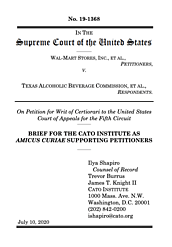The Constitution guarantees the right to engage in commerce within the United States free from interstate trade wars through what’s known as the “dormant” Commerce Clause, which stops protectionist state regulations. Last year, the Supreme Court’s groundbreaking opinion in Tennessee Wine & Spirits Retailers Association v. Thomas reaffirmed this principle, holding Tennessee’s durational residency requirements for retail liquor licenses unconstitutional. (Cato filed a brief in that case and published an article on the ruling in the Cato Supreme Court Review.)
As the Court discussed, the residency requirements effectively prevented any publicly traded corporation from selling liquor at retail in Tennessee. These requirements created precisely the discriminatory effect on interstate commerce that the dormant Commerce Clause prohibits. Despite the clear ruling in Tennessee Wine, however, the U.S. Court of Appeals for the Fifth Circuit recently declined to invalidate a Texas law with the same effect.
Texas bans publicly traded companies from obtaining the “package store” permits (or “P permits”) required for retail liquor sales. At the same time, the ban has a grandfather clause exempting companies that had a P permit before the law went into effect. As a result, the only public corporations with a P permit are Texas companies who had met the old, unconstitutional residency requirement. Even without the grandfather clause, however, the public corporation ban has served its intended protectionist purpose: 98% of retail liquor stores in Texas are owned by Texans.
Walmart filed a lawsuit challenging the Texas law. The Fifth Circuit upheld the law, finding that it had no discriminatory effect on out-of-state businesses. In reaching this decision, the court ignored the grandfather clause and analyzed the remainder of the law under a highly formalistic test that is in clear tension with Tennessee Wine.
Walmart has now asked the Supreme Court to review the case, which petition Cato has supported with an amicus brief. We argue that the dormant Commerce Clause unquestionably guarantees the right to engage in the interstate alcohol trade free from discriminatory state regulations. The Texas law contradicts this central constitutional principle. The ban on public corporations owning retail liquor stores does exactly what it’s supposed to do: shield Texas companies from out-of-state competition. Moreover, by granting an exemption to in-state companies that is unavailable to out-of-state companies, the grandfather clause blatantly favors in-state businesses.
Between its refusal to engage with the implications of the grandfather clause, its highly formalistic analysis of the discriminatory effects of the law, and its disregard for Tennessee Wine, the Fifth Circuit’s approach treats the constitutional guarantee of free interstate commerce as dead letter. Even a moderately talented legislator could craft a protectionist law that appeared sufficiently neutral to pass constitutional muster in the Fifth Circuit.
The Supreme Court should thus hear Walmart’s case, reaffirm the strong dormant Commerce Clause principles of Tennessee Wine, and open up the liquor trade in Texas.




